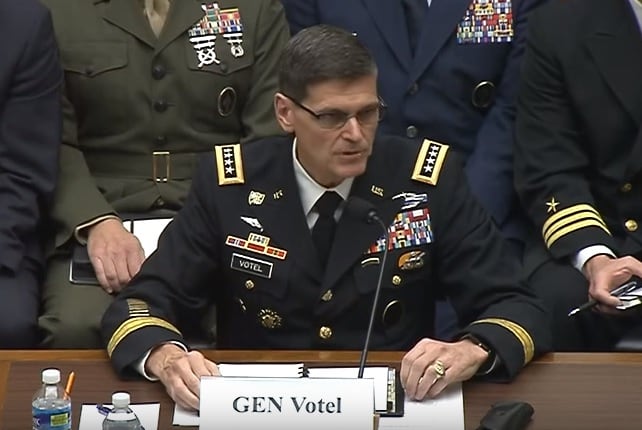The head of U.S. Central Command told lawmakers on Capitol Hill Thursday that he supports increasing the number of U.S. forces in Afghanistan and he also addressed growing concerns about mission creep in Syria and the war against the Islamic State group.
Army General Joseph Votel, the CENTCOM commander, said he agreed with recent statements from the head of the U.S. mission in Afghanistan, Army Gen. John Nicholson, that the conflict in Afghanistan is a stalemate.
Nicholson testified on Capitol Hill in February and said he needs more forces for the "advise and assist mission" that helps Afghans target the Taliban insurgency.
Votel responded "yes" to a question from Sen. John McCain, R-Ariz., asking whether the general agreed with Nicholson.
There are currently about 8,400 U.S. troops in Afghanistan, a force level that has been declining steadily for five years. It's unclear whether the Trump administration will approve any additional forces for the mission.
Lawmakers on Capitol Hill also pressed the CENTCOM commander on worrying events unfolding in Syria in the war against ISIS.
On Monday, Pentagon officials announced U.S. special forces with a small contingent of conventional troops and Stryker vehicles were conducting a new mission referred to as an "assure and deter" operation in the Syrian city of Manbij to sway potential allies and adversaries from provoking conflict with U.S. Kurdish allies in the region.
"I foresee a train wreck here," said McCain, the chairman of the Senate Armed Service Committee, as he expressed worry that an open conflict may erupt between Turkey, a U.S. NATO ally, and the Kurdish YPG militias, who have received considerable support, training, and funding by the U.S. to fight ISIS.
The U.S. understands Turkey's concern over "undue Kurdish influence," Votel said.
Turkey has long considered Kurdish YPG militias as a proxy of U.S. designated terror group the Kurdish PKK. Turkey's position has created strain in the coalition between the U.S. and Turkey, as YPG militias have been a major driving force of success against ISIS in Syria.
Currently large contingents of YPG forces are surrounding Raqqa alongside other factions of the Syrian Democratic forces, poised to strike the ISIS capital.
"Principally U.S. forces are there to make sure ISIS doesn't come back, but also for over watch" Votel said, addressing the new "reassure and deter" mission by U.S. forces in Manbij. "If not careful, we could find ourselves in a different situation" Votel said, trying to allay concerns of worried lawmakers.
"This is an extraordinarily complex region," Votel said. We are trying to be as "transparent as we can," Votel said, describing information sharing with Turkish allies over the Kurdish issue.
We are "looking to mitigate tension," he added.
Adding to the growing U.S. presence in the region, U.S. Marines with the 11th Marine Expeditionary Unit have set up a small outpost in Syria to provide artillery support for the impending siege of Raqqa in an effort to "ensure capable fire support," Votel said.
An additional 400 "enabling" forces are expected to deploy to Syria, according to a spokesman for Operation Inherent Resolve.
Officially, the number of U.S. troops who can deploy to Syria is capped at 503. However, commanders have flexibility to breach that cap for limited periods of time. The total number of U.S. forces operating in the region is unknown at this time.
Recent developments in the region have underscored concerns about mission creep and U.S. involvement in the Syrian civil war. Support for Arab and Kurdish coalitions waiting to assault Raqqa will likely require aid beyond fire support.
"The YPG will need increased, direct support in the form of armored vehicles, weapons, ammunition, and artillery support," said Jennifer Cafarella, an expert on the Syria conflict for the Institute for the Study of War.
"The recent deployment of U.S. Marines to Syria will cover the artillery requirement. Direct U.S. involvement will likely also extend to increased support for logistics and command and control," she said.
As ISIS’s war-making capabilities have degraded and its territory has been significantly reduced, U.S. efforts in the region have become ever more complicated. The recent influx of conventional forces and new mission sets opens questions concerning America’s overall strategy in the conflict.
Frustrated with America’s lack of a cohesive strategy, McCain described the current policy in the region as "treating the symptoms and ignoring the disease."
"We should not be surprised of the results," he said.
Senior Staff Writer Jeff Schogol contributed to this report.
Shawn Snow is the senior reporter for Marine Corps Times and a Marine Corps veteran.





